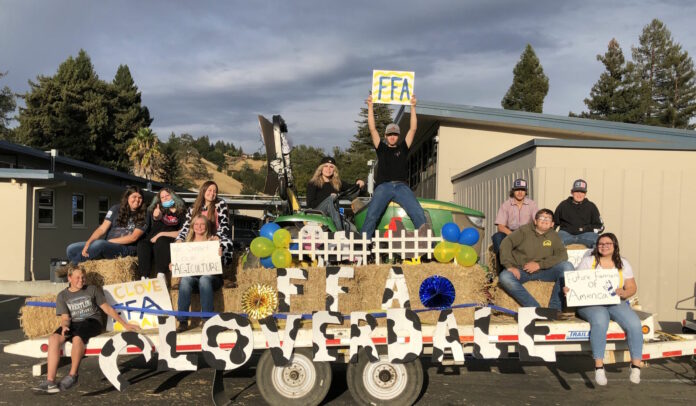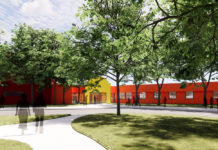As Sonoma County’s agriculture industry grows, the agriculture classes available to students in the county are also growing. For some students in Cloverdale, these classes offer them an opportunity to both think more critically about the agriculture industry that surrounds them and learn more about sustainable farming practices.
Over the past two years, Cloverdale High School has offered two new classes for students that focus on agriculture — biology and sustainable agriculture, and agriculture and natural resources.
The high school’s farm to table course is also taking on a more agricultural focus than it had when it was more of a culinary course, teacher Angelica Fernandes said, with students working in the high school garden and learning more about sustainable farming practices.
“All three tie in with being sustainable and how farmers are taking on sustainable practices,” Fernandes said. “With the world changing, climate change, all of those things, farmers are having to deal with that just as much as everyone else.”
Fernandes is in her second year teaching at Cloverdale High School and, to her knowledge, 2020 was the first year that the high school had multiple classes focusing on areas in agriculture.
Students have the option to take biology and sustainable agriculture or regular biology, since the agriculture-reared course was recently approved to count toward college credit, Fernandes said. The other two classes are offered as electives.
In her agriculture and natural resources course, Fernandes teaches “just a little bit of everything within the ag industry to kind of get kids learning about different industry sectors,” she said.
The subjects taught in the class range from plant and natural science to sustainable practices to California agriculture.
“I have a lot of kids who specifically want to take my classes because they have an interest in working in the agriculture industry somehow, or because they grew up around it,” Fernandes said. “I also have kids who never grew up around the ag industry but are interested in my classes because they’re different courses that Cloverdale’s never offered before.”
The school did have an ag and natural resources class before she started working there, Fernandes said, but she isn’t sure how similar it was to the class she’s currently teaching.
“I feel like with any elective course, students are getting hands-on learning experience through those courses. With the ag courses that I’m offering, especially in Sonoma County as a very ag-oriented community, a lot of students don’t really know that,” Fernandes said. “They don’t realize where they live — they know that there’s grapes and there’s winegrapes, but that’s it. I think finally them taking a course and teaching them about Sonoma County agriculture, California agriculture and how that ties in with that, a lot of (students) were surprised.”
Incorporating hands-on education
One of the things that sets these classes apart from the normal core of classes that students can take is that the nature of them being electives means that students might have more opportunities to learn outdoors, applying their classroom knowledge to real-world situations.
One way Fernandes does this is by having her classes work in the school garden.
“They learn different tools and what to do — we’re about to start learning about drip systems — that’s all the kids doing,” Fernandes said. “I provide the supplies, we talk about what each item is, what it does and then they learn how to put in drip irrigation, what kind of soil is best for a certain plant and then just whatever we’re learning, if it is related to anything outside of the classroom, we go outside.”
The garden also serves as a tool to help teach the school’s farm to table students what crops are best for what seasons and other practices.
Cloverdale High School junior Agjes Nerguti said that, of the agriculture classes he’s taken at the high school, his favorite was farm to table because it gave him the chance to see the food grow from planting it to picking it, culminating in the class making salsa using tomatoes and peppers form the garden.
Gracie Bunting, a junior currently enrolled in the class, echoed Nerguti, noting that going out in the garden and using the grown produce to cook is also her favorite part of the class.
“I think this class is really beneficial to anyone that would take it, because you’re going to learn about things that you can use every day — from cooking to how to grow vegetables and things like that — it can really spark interest in students that might not have an interest in a traditional class,” Nerguti said.
Reintroducing FFA
Running alongside Cloverdale’s agriculture-focused classes is a new FFA program, introduced last year by Fernandes.
“Cloverdale used to have an FFA program, from 1953 to 1954, and that was the last time they ever had it,” Fernandes said.
Other communities in Sonoma County like Healdsburg and Sebastopol have FFA, and Fernandes said that community members are happy that they now have a hometown program.
“We’ve gotten a lot of good community feedback from people who are happy that FFA is finally here,” she said.
FFA runs alongside Fernandes’ classes, which also follow FFA’s three circle-model, which incorporates FFA, supervised agricultural experience and classroom time.
According to Fernandes, the FFA portion involves conferences, teaching leadership skills; the agricultural experience is covered in her classes by student projects that have to be agricultural based; and the classroom portion is covered in the day-to-day work that students do while in Fernandes’ class.
“My mom did FFA when she was in high school and she told me about it and I thought it was really interesting,” said Nerguti, who is serving as Cloverdale FFA vice president this year. “I’ve done smaller things like raise chickens and rabbits. I’ve had gardens and stuff like that, and I heard that if you join FFA you can raise animals like pigs, sheep, goats, cows for the fair, so I thought that would be interesting.”
For Bunting, FFA president, she joined FFA because it builds on the interest she already had in farming and agriculture.
While Cloverdale’s FFA program is still young, Fernandes said she hopes to see it grow over the next three to five years.
“It’s been a slow start, but kids are catching on to it and enjoying it,” she said.
“It’s another outlet for students. FFA is a place for everyone. It’s not just for the ag kids or the kids who want to go straight into the workforce, everyone has a place in FFA,” Fernandes said.










